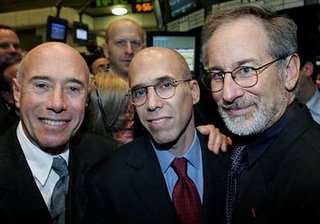DreamWorks Sale—Why the Dream Didn't Work

{PHOTO: Peter Morgan/Reuters}
by Sean Smith - NEWSWEEK/Dec. 19, 2005 issue
The dream is over. Eleven years after founding their studio, Steven Spielberg, David Geffen and Jeffrey Katzenberg agreed to sell DreamWorks SKG to Viacom for a reported $1.6 billion. Viacom's studio division, Paramount Pictures, gets DreamWorks' library of about 60 films—such as "Saving Private Ryan" and Oscar winners "American Beauty" and "Gladiator"—along with a slate of films DreamWorks planned to release next year, including Clint Eastwood's "Flags of Our Fathers." Spielberg will likely give Paramount first dibs on his movies, and Paramount will get half the profits of any movie he makes at another studio. The biggest prize, though, is that Paramount, led by Brad Grey, who initiated the deal, will now distribute films from DreamWorks Animation. A separate, publicly traded company run by Katzenberg, DreamWorks Animation created the "Shrek" movies, which have grossed $1.4 billion worldwide.
Despite DreamWorks' successes, the company never quite lived up to its potential. Plans for a studio campus in L.A.'s Playa Vista section were scrapped, the record label and videogame unit were sold off, and while other major studios release more than 20 movies per year, DreamWorks has released an average of only six per year since 2002.
Just about everybody in Hollywood has an opinion about what went wrong. One theory, voiced by a rival studio head (who refused to be identified while commenting on industry matters), was that DreamWorks could not survive because the costs of running a studio now are so high that it's impossible to make a profit without other large revenue streams, including a sizable DVD library. A few filmmakers saw a different problem: bad management. The live-action studio was run, until recently, by the married team of Walter Parkes and Laurie MacDonald, who also produced more than a few of the movies that DreamWorks released. Thus, the criticism goes, the couple was busy on film sets producing its own movies instead of greenlighting other people's. (The couple has repeatedly said that there was no conflict, and no conflict of interest, between the two jobs.)
But perhaps the primary failure at DreamWorks was simply one of will. Of the three founders, only Katzenberg wanted to actually head a studio; now he is, at DreamWorks Animation. Spielberg's first love has always been directing, and he has spent the last year on sets making "War of the Worlds" and "Munich" back to back. And Geffen has always been upfront about his distaste for the movie business. What both men wanted, it seems in retrospect, was the power and freedom of owning a studio, not the burden of running one. And who can blame them? If you were Steven Spielberg, would you want to sit behind a desk, fretting about profit-and-loss statements? Didn't think so.

<< Home